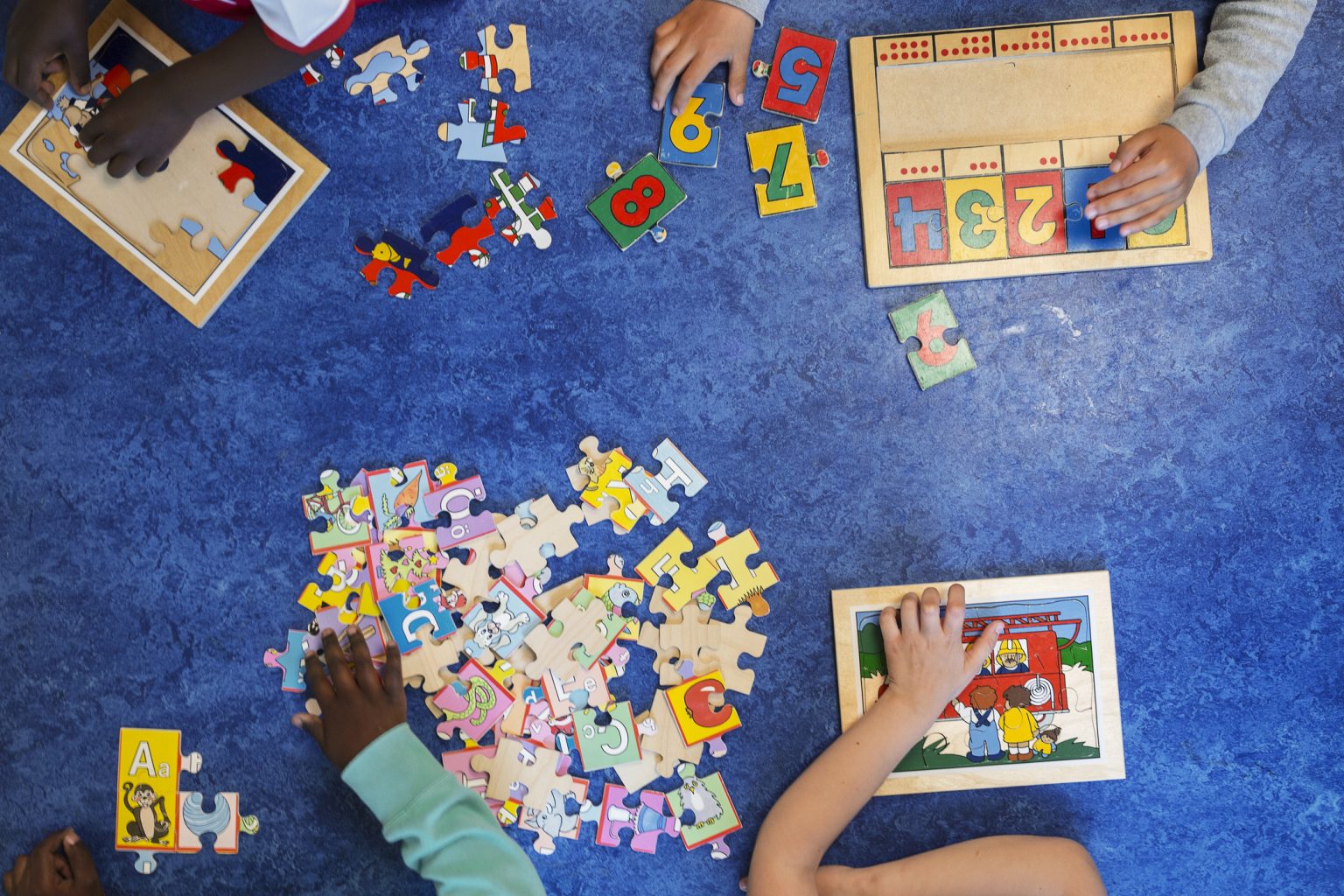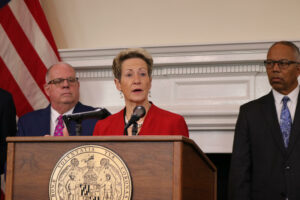Child Care Providers for Essential Workers Worry as They Wait for Payment From State

On a typical day, about 80 children would giggle and squirm through the doors of Sue Mogard’s Educare Learning Center in Jefferson.
But that was before COVID-19 hit. And before the state effectively took over administration of child care during the state of emergency in Maryland, scaling back operations and limiting centers to the children of essential workers.
The state’s child care industry was closed down in late March with a posted notice from State Superintendent of Schools Karen B. Salmon on the Department of Education website. Providers could apply for new, restricted licenses and quickly reopen to serve children of first responders and essential workers through a new state Essential Personnel Child Care Program.
Roughly half of the state’s child care providers ― about 3,700 ― reopened under strict sanitation and distancing requirements to serve about 27,000 children and to be paid by the state of Maryland.
But four weeks in, the child care centers that have remained open have not been paid by the state and expenses are mounting.
“We are having a crisis in this crisis,” Mogard said Friday. “…The system has failed us while they’re expecting us to put our own staff at risk.”
The state owes her center about $32,000 as an essential provider, Mogard said.
The program was created to lift the burden of child care costs and payments from essential workers, with the state agreeing to pay providers $250 a week for children older than 3 years old and $350 a week for children under 3.
Christina Peusch, executive director of the Maryland State Child Care Association, said Friday that disorganization and poor communication have marred the program, with millions of dollars owed to providers throughout the state.
“Right now, we’re teetering on not being able to survive ― even for essential personnel,” Peusch said.

Maryland Superintendent of Schools Karen B. Salmon. Photo by Danielle E. Gaines.
Salmon wrote a letter to child care providers on Friday acknowledging delays and offering “sincere thanks” for their service. The state promised “immediate grant payments” of $2,000 to all essential providers by the end of next week.
Since late March, the Department of Education has been working “diligently to build an administrative framework to ensure these services are delivered by appropriate providers, that they are delivered in accordance with the standards that Maryland families deserve, and to provide seamless, prompt payment to our providers,” Salmon wrote.
While a department spokeswoman said some providers have received some payment, the state could not provide an overall figure. Peusch said most providers hadn’t received the bare minimum, including promised advances between $800 and $1,600 to help child care centers cover coronavirus-related expenses.
Providers said they are facing increased challenges around nearly every corner: from buying protective equipment and cleaning supplies in a hypercompetitive marketplace, to just getting enough gallons of milk from supermarkets enforcing strict quotas.
At first, the staff at Tracy Jost’s Kids Campus Early Learning Center wore homemade face masks, but she wanted a higher-rated protection. After searching online, Jost ultimately paid $450 to buy 50 masks, and shelled out another $180 for two no-contact thermometers.
About 35 children are still attending her Dunkirk-based center, which usually serves about 150 children, Jost said.
The center is owed about $36,000 from the state for operating the essential workers program, she said.
Earlier this month, a last-minute payment from the federal Payroll Protection Program allowed her to pay her employees.
“That was the only thing that kept me from not having to close,” Jost said. “…I almost didn’t make payroll for the first time in 14 years.”
Lisa Herbst, who owns two child care centers in Anne Arundel County ― Wee Lad & Lassie Early Learning Center and A Child’s Garden Preschool & Child Care ― said she’s applied for three different state and federal small business relief programs, but hasn’t received funding from any of them. She’s also received no payment from the state for opening as an essential provider, Herbst said.
She’s dipped into and depleted her savings to continue providing care for 11 children between the two centers, where she used to serve about 100.
“Since we decided to heed the call and become an essential personnel child care site, for four weeks, starting five on Monday, no funding has been received,” Herbst said Friday. “I had two payrolls, a month of business expenses ― the building mortgage, utilities, insurance, supplies ― all out of the meager reserves I had. It’s gone. So if money doesn’t come through, we have no choice but to close.”
Peusch said the state needs to ensure payment for providers as quickly as possible.
“Child care workers stepped up to serve essential personnel. And they are essential personnel,” she said. “They’re risking their own safety, their loved ones’ safety and their staff’s safety to do this.”
Concerns about the missing payments prompted a brief dustup Friday morning after a post on social media suggested that Comptroller Peter V.R. Franchot’s office was delaying payment. Franchot (D) issued a statement saying his office would process payments to child care providers as soon as they were received.
“We will mail checks and process direct deposits within hours of receiving the necessary information from MSDE,” Franchot posted on Facebook.
Lawmakers have made attempts to stabilize the child care industry during the pandemic. About $45.5 million in grants for child care were directed to the state of Maryland through federal stimulus program.
Peusch said she’s worried about the future of child care in the state. Most providers will have no way to make up for lost income into the future and some centers may never reopen. Those that do will likely have to abide by new physical distancing or public health guidelines that could limit capacity.
“We’re just hoping that there’s enough programs out there that we’re not going to be completely diminished and decimated,” Peusch said.




 Creative Commons Attribution
Creative Commons Attribution